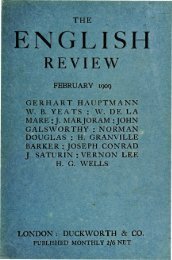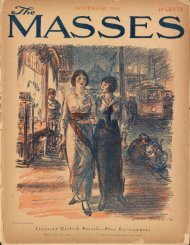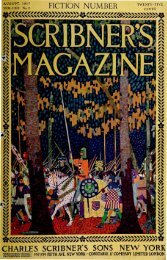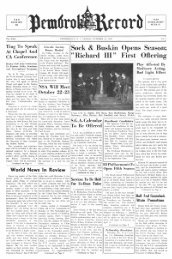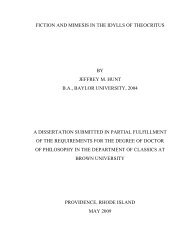View PDF - Brown Library
View PDF - Brown Library
View PDF - Brown Library
You also want an ePaper? Increase the reach of your titles
YUMPU automatically turns print PDFs into web optimized ePapers that Google loves.
SCRIBNER'S MAGAZINE<br />
VOL. LVII FEBRUARY, 1915 NO. 2<br />
PERSONALITY OF COLONEL GOETHALS<br />
By Joseph Bucklin Bishop<br />
For nine years Secretary of the Isthmian Canal Commisson; author of " The Panama Gateway "<br />
ISAAC DISRAELI, in that<br />
most delightful of books,<br />
'' Curiosities of Literature,''<br />
makes this observation,<br />
which is as true to-day as<br />
it was when written a cen<br />
coming familiar with the intellectual and<br />
moral qualities which form the basis of<br />
what is called character and which constitute<br />
the personality of a man. That<br />
Colonel Goethals has a distinct personality<br />
no one who knows him or has followed<br />
his career will deny. That it is a<br />
strong personality as well, every one who<br />
has been in the Canal service will testify<br />
without hesitation or qualification.<br />
It is customary to regard the construction<br />
of the Panama Canal as an engineering<br />
achievement, but it is in equal, if not<br />
in larger, degree an achievement in administration.<br />
The engineering problems were<br />
comparatively simple, being those of magnitude,<br />
the solution of which followed<br />
clearly defined and well-established scien<br />
tury ago: How superficial is that cry of<br />
some impertinent pretended geniuses of<br />
these times who affect to exclaim: 'Give<br />
me no anecdotes of an author, but give me<br />
his works !' I have often found the anecdotes<br />
more interesting than the works."<br />
In conversation a few years ago with John<br />
Hay I cited this utterance in support of<br />
something that he was saying to the same<br />
effect, whereupon he added (I quote from<br />
memory): "Real history is not to be<br />
found in books, but in the personal anecdotes<br />
and private letters of those who tific lines. The problems in administration<br />
make history. These reveal the men<br />
were new and there were no prece<br />
themselves and the motives that actuate dents in American experience from which<br />
them, and give us also their estimate of to obtain light for guidance.<br />
those who are associated with them. No The Canal force has been referred to<br />
one should ever destroy a private letter frequently as being in the position of an<br />
that contains light on public men, or willingly<br />
let die an illuminating anecdote dis<br />
partial. An army in the field is under the<br />
army in the field. The parallel is only<br />
closing their individuality."<br />
absolute control of its commanding general<br />
In what I am about to write concerning<br />
from the moment of its departure for<br />
the personality of Colonel Goethals I shall the scene of action. This control is the<br />
follow mainly the idea thus outlined. I established order of the military system<br />
shall endeavor to portray him as he revealed<br />
and is unquestioned. The Canal force,<br />
himself to me during seven years of<br />
intimate association in which he honored<br />
like an army, was in the field, two thousand<br />
miles from its base of supplies, but<br />
me with his confidence and admitted me when assembled on the Isthmus it was an<br />
to the inestimable privilege of his personal army of civilians, and there was no established<br />
friendship. Throughout that period I<br />
authority for its absolute control by<br />
was a constant observer of his official acts, the man at its head. Every member of it<br />
of the methods by which he met and knew this. Not only did the rank and<br />
solved the problems which pressed upon file know it, but the subordinate officials<br />
him incessantly for consideration, thus be<br />
knew it. Experience was to show that it<br />
Copyright, 1915, by Charles Scribner's Sons.<br />
All rights reserved.<br />
VOL. LVII.—13 129



